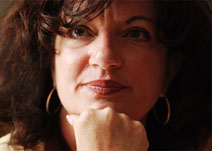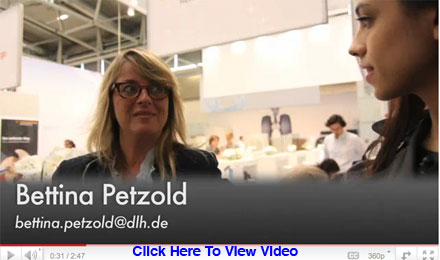|
 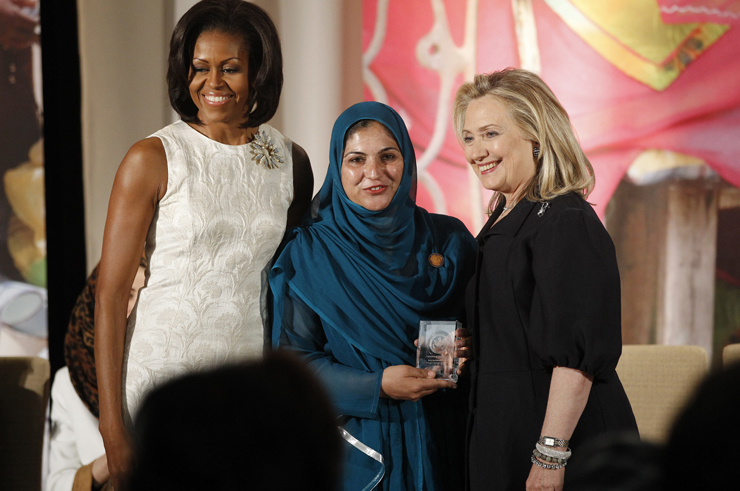
In Washington,
D.C, at the U.S. State Department, First Lady Michelle Obama and Secretary
of State Hillary Rodham Clinton present the 2012 International Women
of Courage Award to Shad Begum of Pakistan, for providing education
opportunities, political training, and microcredit to Pakistani women,
on the 101st Anniversary of International Women's Day.
Today,
March 8 marks the Anniversary of International Women's Day, and we here
at FlyingTypers would like to take a moment to recognize and appreciate
the achievements of women, in both air cargo and the world at large.
We invite our global readers to click
the pictures here and read all about the extraordinary group of women
at work today that are building our industry to new heights.
But first, a bit about this very special
day.
International Women's Day began nationally
in the United States in February 1909, following a march of 15,000 women
in New York City for better pay, voting rights and shorter working hours.
The day was adopted internationally when Clara Zetkin, leader of the
"Women's Office" for the Social Democratic Party in Germany,
proposed that there should be a Women's Day every year, in every nation—a
day in which women's rights and demands could be unified and put forth
on an international level.
In March 1911, a million participants
in Switzerland, Austria, Denmark, and Germany marched for IWD. The day
was marked as a day to recognize and promote equal rights and women's
suffrage. International Women's Day has
only grown larger since then, spreading as an official holiday in Afghanistan,
Armenia, Azerbaijan, Belarus, Burkina Faso, Cambodia, China, Cube, Georgia,
Guinea-Bissay, Eritrea, Kazakhstan, Kyrgyzstan, Laos, Madagascar, Moldova,
Mongolia, Montenegro, Nepal, Russia, Tajikistan, Turkmenistan, Uganda,
Ukraine, Uzbekistan, Vietnam, and Zambia. While other countries may
not have adopted the day as an official holiday, it is nonetheless recognized
as a special day across the world.
Over the past few years, IWD has been
'themed,' with 2010 shining a light on displaced women and 2011 marking
the 100th Anniversary of the day with celebrations in over 100 countries.
The 2012 theme for IWD is "Empower
Women – End Hunger and Poverty." Oxfam America is inviting
people to celebrate inspiring women in their lives by sending a free
International Women’s Day e-Card—you can also host an event
to honor a woman in your community who is making a difference. (http://actfast.oxfamamerica.org/index.php/issues/women)
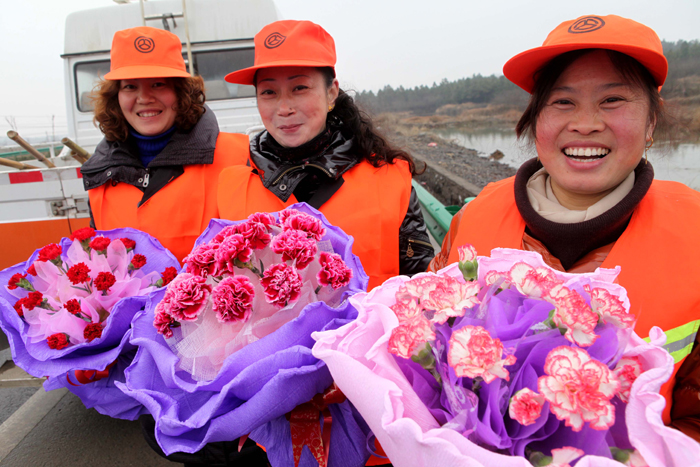
Celebration
all over the world…Flowers are sent to female highway maintenance
workers as the world celebrates International Women's Day in Maanshan,
Anhui, China, on Thursday, March 8, 2012.
|
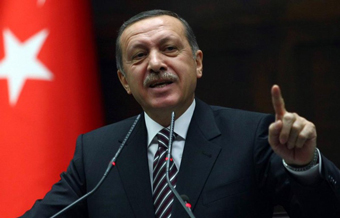 Turkey has honored IWD by passing a number
of laws today that protect women and children from abuse. Prime Minister
Recep Tayyip Erdogan (left) said, "We will provide legal and financial
assistance and shelters to the victims.” The laws passed will
increase penalties against abusers, allow police to intervene sooner
in cases, and force abusers to wear electronic monitoring devices. These
laws come on the heels of the death of a Turkish mother, who was killed
by her husband for leaving the house after an argument. In response,
four Ukrainian women activists staged a topless demonstration to protest
domestic violence against women in Turkey. Inna Shevjenko, a member
of Femen, the women's group, said, "The message for Turkish women
who are celebrating Women’s Day is not to wait until your husband
brings flowers or chocolates. Just remember about your rights. Go out
on the street and fight for that. This is the message.”
Turkey has honored IWD by passing a number
of laws today that protect women and children from abuse. Prime Minister
Recep Tayyip Erdogan (left) said, "We will provide legal and financial
assistance and shelters to the victims.” The laws passed will
increase penalties against abusers, allow police to intervene sooner
in cases, and force abusers to wear electronic monitoring devices. These
laws come on the heels of the death of a Turkish mother, who was killed
by her husband for leaving the house after an argument. In response,
four Ukrainian women activists staged a topless demonstration to protest
domestic violence against women in Turkey. Inna Shevjenko, a member
of Femen, the women's group, said, "The message for Turkish women
who are celebrating Women’s Day is not to wait until your husband
brings flowers or chocolates. Just remember about your rights. Go out
on the street and fight for that. This is the message.”
 While I wish I could say that everything
has changed in the hundred years since the day’s inception, in
many cases, we see that it has not. In America, International Women's
Day this year was preceded by verbal attacks on women's reproductive
rights and on individual women like Sandra Fluke, coming from the conservative
movement.
While I wish I could say that everything
has changed in the hundred years since the day’s inception, in
many cases, we see that it has not. In America, International Women's
Day this year was preceded by verbal attacks on women's reproductive
rights and on individual women like Sandra Fluke, coming from the conservative
movement.
At FlyingTypers, we routinely
receive comments regarding our use of the term "Women on Top"
for our series that celebrates women in air cargo—mostly accusations
regarding the double entendre some readers choose to see. I've always
found it interesting that readers should choose to interpret "Women
on Top" to mean something dirty, unseemly, and overtly sexual,
when our use of it is only meant to convey that women are, in fact,
on top in areas of air cargo. To me, it speaks more about the audience
then it does about us, and if I had to point any fingers, I would point
them squarely at our society, at the way we raise our children, and
at the scripts we write regarding gender roles and sexuality. Turn on
the TV to any channel in America, and you will find commercials cleanly
divided along gender lines—women using cleaning products, cooking
food products, parenting with baby products, or using products to enhance
their physiques; men drive automobiles, work on the house/lawn, or drink
alcoholic products. Women in advertising are reduced to food (such as
the sexualized female M&M), inanimate objects (such as cars, like
in the recent controversial Fiat commercial aired during Superbowl 2012),
and sometimes, just body parts (see any GoDaddy commercial ever aired).
These stories we tell ourselves have a direct effect on how we view
one another as men and women, and so of course, a woman on top must
translate sexually because, at the end of the day, women are seen as
sexual objects and rarely more than that. The brain immediately associates
women with sex because it has been programmed to do so. How could the
term "Women on Top" mean anything else? And more importantly,
if the term were "Men on Top," would we take it the same way?
Today we celebrate the women featured
in this issue and all women in air cargo and otherwise. This International
Women's Day, we hope everyone will do their part to help empower women,
even if it means rewiring one's brain to see women as more than sexual
bodies—even if it means reimagining "Women on Top" as
women in charge.
Flossie Arend
|




 Turkey has honored IWD by passing a number
of laws today that protect women and children from abuse. Prime Minister
Recep Tayyip Erdogan (left) said, "We will provide legal and financial
assistance and shelters to the victims.” The laws passed will
increase penalties against abusers, allow police to intervene sooner
in cases, and force abusers to wear electronic monitoring devices. These
laws come on the heels of the death of a Turkish mother, who was killed
by her husband for leaving the house after an argument. In response,
four Ukrainian women activists staged a topless demonstration to protest
domestic violence against women in Turkey. Inna Shevjenko, a member
of Femen, the women's group, said, "The message for Turkish women
who are celebrating Women’s Day is not to wait until your husband
brings flowers or chocolates. Just remember about your rights. Go out
on the street and fight for that. This is the message.”
Turkey has honored IWD by passing a number
of laws today that protect women and children from abuse. Prime Minister
Recep Tayyip Erdogan (left) said, "We will provide legal and financial
assistance and shelters to the victims.” The laws passed will
increase penalties against abusers, allow police to intervene sooner
in cases, and force abusers to wear electronic monitoring devices. These
laws come on the heels of the death of a Turkish mother, who was killed
by her husband for leaving the house after an argument. In response,
four Ukrainian women activists staged a topless demonstration to protest
domestic violence against women in Turkey. Inna Shevjenko, a member
of Femen, the women's group, said, "The message for Turkish women
who are celebrating Women’s Day is not to wait until your husband
brings flowers or chocolates. Just remember about your rights. Go out
on the street and fight for that. This is the message.” While I wish I could say that everything
has changed in the hundred years since the day’s inception, in
many cases, we see that it has not. In America, International Women's
Day this year was preceded by verbal attacks on women's reproductive
rights and on individual women like Sandra Fluke, coming from the conservative
movement.
While I wish I could say that everything
has changed in the hundred years since the day’s inception, in
many cases, we see that it has not. In America, International Women's
Day this year was preceded by verbal attacks on women's reproductive
rights and on individual women like Sandra Fluke, coming from the conservative
movement. 


